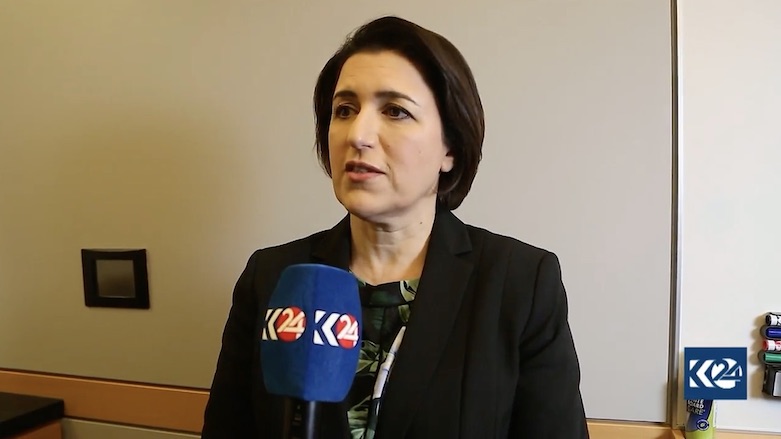KRG Envoy says burning of KDP office in Baghdad reaction to Sinjar agreement

ERBIL (Kurdistan 24) – Bayan Sami Abdul Rahman, the Kurdistan Regional Government’s (KRG) representative in Washington, argued on Thursday that the recent attack on the Kurdistan Democratic Party (KDP) office in Baghdad was a response to the Sinjar agreement between Erbil and Baghdad.
Related article: Hashd al-Shaabi supporters burn KDP office, Kurdistan flag in Baghdad
The Kurdish diplomat’s statement came during an online event titled Peace-building and Rights at Columbia University’s Institute for the Study of Human Rights.
Abdul Rahman, who is originally from Sinjar, said that the recent “Sinjar agreement… is really very significant and could lead to other agreements, for example, over the Nineveh plains and other areas if this one is successful.”
“I think this is why we're seeing some pushback from some of the militias. It's not a coincidence that they attacked the Kurdistan Democratic Party headquarters in Baghdad. It really was a reaction against the agreement in Sinjar.”
She added that the agreement would bring stability and establish peace so that displaced Yezidis could return. “This what we want for all displaced communities, whether they are Muslims, Christians, or Yezidis. They should all able to return home in safety and dignity.”
“We hope Sinjar agreement continues to progress, we need all of your support in Kurdistan in Iraq, here in America, we need all your support for this agreement to continue and hope to implement similar agreements elsewhere,” she concluded.
The Government of Iraq and the Kurdistan Regional Government (KRG) announced on October 9 they had reached an agreement with support from the United Nations (UN) to restore and normalize the situation in the Sinjar.
Notably, the agreement includes understandings to withdraw all armed groups from the area; restore the local administration; appoint a new mayor. It also provides for the employment of 2,500 locally recruited security forces.
Almost five years have passed since November 2015, when Sinjar was freed from ISIS’ reign of terror by Kurdish forces, backed by the US-led Coalition.
Since late 2017, however, the area has been under the control of Iraqi forces and Hashd al-Shaabi militias, after they drove out Peshmerga forces in the Iranian-orchestrated attack that followed the Kurdistan independence referendum.
In addition, the Shingal Resistance Units (YBS), the local wing of the Kurdistan Workers’ Party (PKK), is active in the area and receives salaries from the PMF.
Much of the city remains uninhabitable rubble, and very few of its former residents have returned to their homes.
The Hashd al-Shaabi (PMF) and the YBS-linked local administration so far have expressed opposition to the agreement. This while the US has expressed support for the deal.
Editing by Khrush Najari
